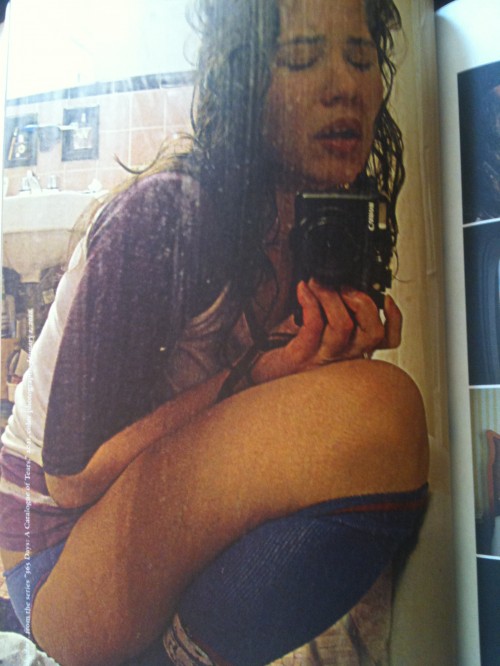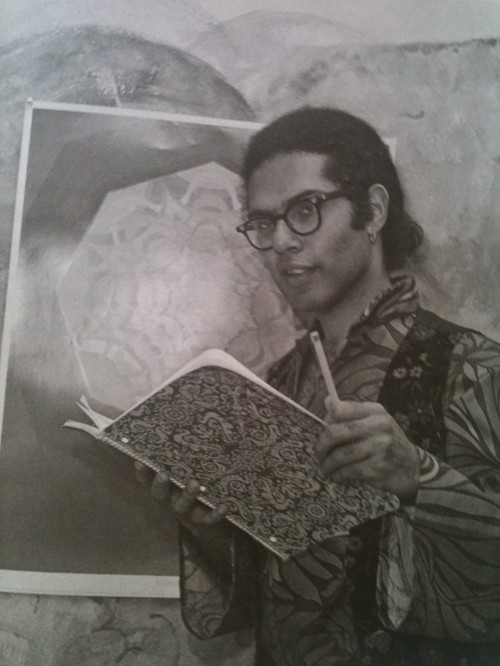The Paris Review [review]
[That’s a clever title for this post, Sean. Thanks, mom. I told you to never read this site. Ever.]
Issue # 197. Summer 2011. (For the first time, you can get it digital) The cover is a drawing by Matteo Pericoli (sounds a little like a petri dish culture), who is a sprezzatura, a renaissance man of sorts. I get a little Al Hirschfeld, a little Michael Cutlip. The paper is thick and will absorb liquid stains. Snot, hot sauce, beer, etc. Fun fact: The Paris Review has had three editors in its lifetime.
The first story is “William Wei” by Amie Barrodale. It is a glow opening, since it is a story that says, ‘You are now reading a literary magazine.’ Detached narrator, drinking, telephone conversations, restaurants, people eating mushrooms embedded in little chocolates, sidewalks, anti-anxiety medications, that manner of thing. The New Yorker used to love these (example), but I’m not saying the New Yorker only publishes one type of story. That’s a damn lie. Barrodale does the style well. I left the story as if rising interrupted from a brief dream, my head a bit leppy.
 [I will credit this photo later, maybe]
[I will credit this photo later, maybe]
Frederick Seidel (sounds a bit like a poker player) writes a poem with this startling opening:
I move my body meat smell next to yours,/Your spice of Zanzibar. Mine rains, yours pours–/Sex tropics as a way not to be dead./I don’t know who we are except in bed.
Then it goes downhill, into a rhyming Barack Obama poem, sort of light verse, sort of nodding back to the earlier days of Paris Review, when many of the poems took this tone. (I’d like to bring syphilis and the word doggerel back into fashion; let’s do that, together. Shall we?)
AABB, CCDD. The best stanza is obviously:
My face between your thighs is resting there. /I’m happy staring at what makes me stare.
Indeed.
Then more Obama, etc. You know, another entry into the rhyming Obama poem genre.
[Listen: You sign up for a subscription, they give you a Paris Review towel. The fuck you going to do with a Paris Review towel? Dry your body in literature, yo. Rub it in. Or: Douche-baggery, at the beach:
So, you’re reading Stephen King, eh? That’s certainly a BIG book. Me? Oh, Gogol, yeh, just finishing it up before I start The Gulag Archipelago. I’m in a frisky little Russian phase right now, that and pina coladas, doubles, frozen. Mind if I plank my towel out right here?]
Then we get an interview with Samuel R. Delany. Like many Paris Review interviews, it’s damn fine. (The interviewer meets eight times with the author, in the thankfully meticulous way of PR.) It will make you want to buy Mr. Delany’s books. It will make you realize Science Fiction is not one genre, it is many (camps I suppose is the term); and possibly these camps are at war? It’s a bit like I’m talking out my ass about coral reefs at this time, that level of knowledge on my subject. Sorry. But Delany is a fascinating man with fascinating words. I nod my head to his take on teaching CW:
Finding time to work is the main problem … You write a decent book, and you’re hired as a creative-writing teacher. The next thing you know, you’re director of the program, which basically means you get less time in class and more administration, which nobody likes, so that you can hardly write anything anymore.
Indeed.
I also found captivating his opinion on contemporary students and their inability to read between the lines and white spaces of classic literature. The sex and violence and etc. would be implied in earlier days, within ellipsis and white space and other technique, but now students just think it was left out—they go, “Why didn’t the author just write the scene?” Back in the day, you could not write the scene. It was censored. So Delany argues most modern student readers are not even “getting” the subversive nature of the omitted spaces in classic literature.
“If he raped her, why didn’t the writer say so?” “If they shot her, why didn’t Conrad show her fall dead?” my graduate students ask. It makes me wonder what other techniques for conveying the unspoken and the unspeakable we have forgotten how to read over four or five thousand years of “literacy.”
Hmm. Well, read the interview. BTW, Delany is not only a SF writer, sorry to imply such a thing. (I’m learning so much myself; here goes another book-buying spree…) He writes nonfiction and is known for several significant works, including an examination of living in an urban commune and a book on the lost culture of gay cruising and street life within Time Square (now a vanished place, via Rudy G. purge).
Cathy Park Hong writes seven historical ballads. These reminded me a bit of Maurice Manning’s excellent work. History and the individual. I also love the word, leppy.
A preacher hitches out Jim to a shaking post./And his leppy body trembles to a million ticks,/A foreboding of what’s to come. /: He’s in you. He’s in you now!
Our Jim cries from such an invasion./:No one never in me. No one.
“Alcorian A-1949” is an odd title for a story by David Gates. Age, lust, music, alcohol. I had to Google Alcorian and got a bunch of wonky nerd game stuff. I’m missing the allusion. Am I stupid? Very, very possible. I’m leaning to yes. Here I really enjoyed how the narrator includes us, the reader, as someone in the room, or on the porch, with him:
Have I been showing you a good enough time? Why don’t you come on out. Bring your drink…
At one point our elderly male narrator writes five movements for string quartet based on the life of Ted Williams; they go:
- The plan is to live on the big boat.
- I made a mistake. I need a lawyer.
- You know who did this to me? Jesus Christ did this to me!
- You’re the abortion I wanted—how do you say that to your son?
- At the damn gate of the park, where we always meet.
Well. That’s poetry.
The finest poems in this issue are by Kevin Prufer. Trust me on this. Both are long (not something we see so often anymore) and involved, sort of cracking open as they proceed. Both pretty much use the exact word required, and then sometimes even further, the better than exact word, the word that makes you go, “Never seen that word there…” One is about dying, while another is about being born, two ideas so similar as to be the same.
Read them your own self! Please?
The visual artists are Laurel Nakadate and Mika Rottenberg.
Nakadate was the more provocative to me, an idea that fuels a bit of discussion about her work. The way she clearly understands the power of scantily clad beauty, but then how she bends the concept, recruiting sad old men around her neighborhood, posing them, role playing with them, alongside her scantily clad beauty, and, oh, say a gun.
Nakadate also spends a year taking daily photos of herself crying. Way up there at the top of this post is January 1, 2010:
My favorite Rottenberg was Barbara:
The second interview is with another Sci Fi guy (WTF?), William Gibson. He invented the word, cyberspace, I shit you not.
What was more important was to name [my landscape] something cool, because it was never going to work unless it had a really good name. So the first thing I did was sit down with a yellow pad and a Sharpie and start scribbling—infospace, dataspace. I think I got cyberspace on the third try, and I thought, Oh, that’s a really weird word. I liked the way it felt in my mouth—I thought it sounded like it meant something while still being essentially hollow.
Lia Purpura has two poems. You remember Lia Purpura from the clusterfuck at Fugue, most likely.
Listen: Let’s assume this entire issue of The Paris Review is a cake. A good, hearty fucker, all thick and slurry chocolate, something. Then someone bakes a knife inside the cake. Now the cake is irrelevant. Everything is now ABOUT THE KNIFE. The cake is there for the knife, not the other way. The Paris Review is going all old-style on us, running the new Roberto Bolano novel (The Third Reich) in installments, five issues. Installment two is in this issue. It is very, very strong. It is shimmering pent-up violence. It is characters named Hannah and The Wolf and The Lamb. It is Camus-like, with a hint of some French female writer I forget—she wrote these starkly odd mystery things. It thrums, this excerpt. I mean it’s shining, the words and situations, the way Bolano has balanced everything. I get this image of slammed doors and missing wave-boarders and sex and armies, clouds of blue shards, something. What? What do I mean? I’m saying Bolano is the knife inside the cake. And this issue is a conveyor for the knife. It’s how I feel.
D. Nurkse writes a flash, in the sort of unfair wake of the Bolano. The editors put the flash there because it certainly matches the tone, almost works as a coda. I think if your name is “D” you are probably OK, or very wrong. Who knows?
Iman Mersal with a flash blending an Afghan woman and the actual art of narrative.
At times, for his own amusement, God leads our memories astray.
Jonathan Lethem concludes our constitutional with “The Empty Room.” More mushrooms, marijuana, drinking (Kids, it’s the Sci-Fi mushroom theme issue!), though I’m not complaining. All three subjects seem fine to me, for fiction, if used to effect. They are used to effect. Most interesting here is the empty room itself, a sort of hollow center of a centrifuge. A sort of space life spins about.
The room was empty now. So it would stay.
“What’s it for” asked his eleven-year-old son.
Anything we want it to be,” my father said.
The story progresses.
You know, an empty space sort of invites total corruptibility. Total corruptibility, think about that term. Well, it’s exciting. I suggest you step inside. Yes, it’s predictable, but then not so. Shrooms! Fucking! It has a knife!
You say you’ve committed the same crime several times…That happens to be the very nature of evil.
Oh, and you should see this sweet towel…
Tags: Amie Barrodale., David Gates, Jonathan fucking Lethem, Kevin Prufer., Laurel Nakadate, Matteo Pericoli, Paris Review all literary and shit, Samuel R. Delany




Is “Detached narrator, drinking, telephone conversations, restaurants, people eating mushrooms embedded in little chocolates, sidewalks, anti-anxiety medications” really indicative of literary fiction, because if you replaced “telephone conversations” with “gmail chats”….
Felt the urge to follow
with “I wake to sleep and take my waking slow”
So what would you do with an HTMLGiant towel?
good post, you’re 2/2
The interviews in this issue were great and I liked The Empty Room. I wanted to know more about the room and the family and especially the father’s preoccupation with keeping that room empty. The story could have pushed the strange factor there. William Wei was interesting. The detachment was so detached. As I read the story, I kept thinking, “How disaffected will this narrative get?” The art was interesting too but I kind of felt like it was a bit antiseptic. I didn’t feel so much when I looked at the images but I definitely was inspired to think. I’m not loving the Bolano novel across four issues. It’s just not grabbing me at all. Nice review, Sean.
I would slather the HTML towel with hummus and eat that fucker.
I cannot stand Gogol. I applaud the towel, and I know where my towel is.
Outside the interviews, I am pretty sure I will always hate The Paris Review…until they publish me.
Man, all reviews should be written this way. And by “this way,” I mean “worth reading.”
What does “glow opening” mean?
I think Mr. Sean Lovelace should read some more Frederick Seidel. I would never go to bat for the guy or anything (or is that what I’m doing now?), but I read something once that aptly compared Seidel’s creeper, bad-taste-before-it-was-cool poetic to Anne Sexton. It was meant to be derogatory, but I find it hard not to think of it as a compliment.
i loved the interviews in this issue. the fiction was good. the poems weren’t as good.
I will, I will. Sexton, huh?
Seriously, after I read his comments on Seidel I thought: dumb bleep. His insights (ha) remind me of the drivel I have to grade as TA in an American Lit class. Really, you should be embarrassed. Skip the Ange Mlinko essay Jason mentions and read Cal Bedient’s review of Seidel in THE BOSTON REVIEW:
“Hide your lyricals, your tenders: Frederick Seidel is coming. Ogre to what used to be called (without a sneer) sentiment, grim beyond Gothic contrivance, the most frightening American poet ever—phallus-man, hangman of political barbarism—Seidel is the poet the twentieth century deserved.”
http://bostonreview.net/BR26.5/bedient.html
Thanks for this review link.
Okay (I can’t see the writing on the left side well enough to read it): A short-legged Geena Davis? Maybe a 3% chance of Janeane Garofalo?